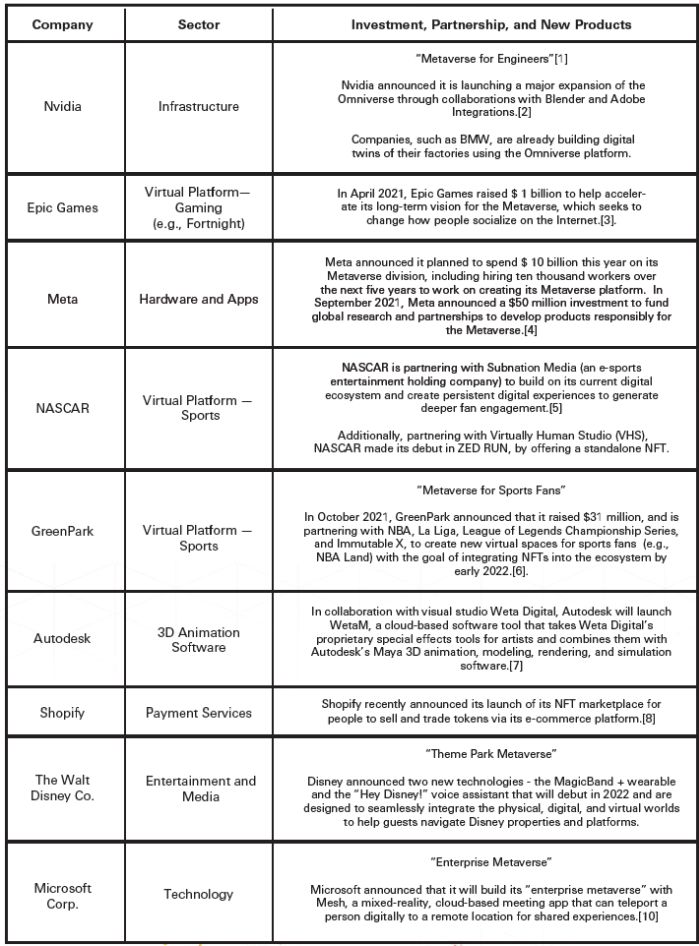- in Canada
Is it here? Not yet. But virtual performances featuring such stars as Travis Scott and Ariana Grande and attracting over 27 million unique players and 78 million viewers1, respectively, suggest that it might be coming sooner than you think. If you have not heard of the Metaverse already, you've probably at least heard that the company formerly known as Facebook, will now be operating as "Meta". This name change comes as the technology giant dives head first into the Metaverse, seeking to become a face, if not the face, of this futuristic virtual world. And they are not alone. Ready to take advantage of a global society primed to navigate e-commerce through its experience with the coronavirus pandemic – with two billion people purchasing goods and services online in 20202 accounting for 18% of all retail sales worldwide3 – companies are increasingly focusing on their future move to the Metaverse. A summary of just some of their activities is presented in the table below.

A basic search of the internet identifies more than 10 million "news" articles featuring the word "Metaverse," with countless articles and press releases identifying companies of all sizes announcing their entrance into the space. So, while the Metaverse has yet to become fully optimized, what is apparent is that many companies do not want to be left behind what could possibly be the next big disruption not just to technology - social media, video games, e-commerce, and blockchain - but to the management and enforcement of a company's assets and intellectual property rights.
What is the Metaverse? That is a good question. And, as many lawyers all too often say, "it depends." But it really does depend, in particular, on the company that's developing it. For NASCAR, it is about enhancing the experience of its fans and taking its "newly developed digital ecosystem to amplify team and driver collaborations, expand brand partnerships, accelerate e-commerce efforts, and distribute original content and archival programming."14 For Meta, it is about creating the "next evolution in online connectivity with people living, working and interacting in an immersive virtual world."15 For SM Entertainment, it is a means to provide exposure and access to the K-Pop artists it represents by developing "virtual characters and avatars[,] the world's first ticketed virtual concert experience[,] a full-fledged web series[,] and even merchandise."16 And, for Gucci, it is a collaboration with Roblox (a company with 43 million daily active users in 180 countries17), not just to offer digital-only collectible and limited-edition Gucci accessories at affordable prices, but also to allow for Gucci items in the Roblox marketplace to be traded, such as the Gucci Dionysus Bag that resold for over $4,100.18
Broadly defined, the Metaverse is a digital ecosystem that provides a "3D experience that can utilize augmented reality (AR), virtual reality (VR), and persistent connections to create an immersive world."19 It is not limited to one omniverse (yet), but possibly thousands of metaverses providing virtual services that have the possibility to span across multiple "verses" thus creating interoperability. Imagine your avatar buying an outfit in one metaverse and then jumping to another to check out a ticketed virtual performance by Adele. It could happen.
But why should you care? According to market research firm Strategy Analytics Inc., the global Metaverse market is expected to reach $280 billion by 2025 - a more than six-fold growth compared to the $46 billion in 2020.20 The Metaverse brings with it a host of opportunities for companies of all sizes - branding and marketing opportunities, new partnerships or collaborations, market expansion, customer diversification, and new product opportunities, to name a few -- that may payout dividends in the end. Indeed, as Roblox indicated, it expected developers and creators to earn $500 million by selling user-generated content in 2021.21 But the move to the Metaverse will bring challenges that may not be limited to the virtual world, and will likely have real world effects on a company's ability to secure, protect, and manage its intellectual property assets. Monitoring use of a brand's trademarks, misappropriation of goods or services, price erosion, and counterfeit goods are just some of the challenges of the unknown, unforeseeable, and unregulated industry the Metaverse presents. And, even if a company decides not to build digital assets, its intellectual property could still enter the virtual stream of commerce.
Thus, it is crucial for companies to begin to think now about their assets and activities, and the possibility for their intersection with the digital world across all decentralized platforms. Brand companies identifying, at least, the digital world that may impact their business the most, will be in a better position to determine future strategies, create partnerships, and answer the question of whether developing a "digital twin" is not just a viable option, but a requirement for their companies. Similarly, newly emerging companies - especially those with plans to operate exclusively in the Metaverse - will need to consider how best to protect their emerging brands, starting from the initial stage of selecting a mark through registration and enforcement of rights in the ever-increasingly interconnected virtual world. Over the next few years and beyond, we will explore opportunities and challenges presented by the Metaverse as they arise, in an effort to help your company navigate and evolve with this fast-changing technological and legal landscape. Today, we start with the basics for newly emerging Metaverse brands: selecting and registering your marks.
Series: The Basics of Selecting and Registering Your Mark
"There can be no doubt that from a business perspective, the [M]etaverse is now a critically important consideration and influence."22 Indeed, the world's biggest companies - from Meta and Microsoft in the United States to Alibaba and Tencent in China - have focused their sights on the Metaverse as the "next iteration of the internet."23 Meta CEO Mark Zuckerberg, for example, mentioned the Metaverse at least sixteen times during the company's July 2021 earnings call, calling it "[t]he future of Facebook."24 In August, Meta opened testing of its Horizon Workrooms, which allows users to connect to virtual offices and attend virtual meetings as avatars, to the public.25 And, both Alibaba and Tencent, among other Chinese companies, have recently rushed to register several Metaverse-related trademarks, in hopes of capitalizing on this growing space.26
As the world's largest companies focus their attention on developing the Metaverse, companies everywhere - big and small - stand to reap substantial benefits. First, brands will be able to advertise like never before. Indeed, "[p]ut a sign on the main street of the [M]etaverse, [] and 'the hundred million richest, hippest, best connected people on earth will see it every day of their lives.'"27 Second, as Nvidia Corp. CEO Jensen Huang predicts, "[t]he economy in the [M]etaverse will be larger than the economy in the physical world."28 Nevertheless, with all of the promise of the so-called world "beyond the universe," the Metaverse will also likely bring with it several challenges.29 Protecting and enforcing trademark and other intellectual property rights in this largely unchartered world will be perhaps the most important issue for brand owners advertising, promoting, and selling their goods and services in the Metaverse.
At the very least, brand owners with a presence in the Metaverse are well advised to register their trademarks and service marks with the United States Patent & Trademark Office ("USPTO") and any foreign equivalents.30 In that regard, brand owners - especially those operating exclusively in the Metaverse or newly established brands - would do well to consider the basics in crafting their strategies for their move to the Metaverse.
A "trademark" is any word, name, symbol, or device, or any combination thereof, used by a person, or which a person has a bona fide intention to use in commerce and applies to register on the principal register, "to identify and distinguish his or her goods . . . from those manufactured or sold by others and to indicate the source of the goods . . . ."31 "[T]here are four categories of [terms] that lie along a spectrum used to categorize proposed marks," and that can be "arranged in an ascending order which roughly reflects their eligibility for trademark status and the degree of protection accorded. . ."32 In ascending order, these categories include (i) generic or common descriptive marks, (ii) merely descriptive marks, (iii) suggestive marks, and (iv) arbitrary or fanciful marks.33
Generic terms are not capable of being registered as trademarks because they are "common descriptive name[s] of [] class[es] of goods or services," and "by definition [are] incapable of indicating a particular source of the goods or services."34 A merely descriptive mark, or one that "immediately conveys information concerning a feature, quality, or characteristic of the goods or services for which registration is sought," is not capable of being registered unless it has acquired distinctiveness or secondary meaning.35 Secondary meaning "'occurs when, in the minds of the public, the primary significance of a mark is to identify the source of the product rather than the product itself.'"36 At the furthest end of the spectrum are suggestive, arbitrary, and fanciful marks, which are "inherently distinctive" and entitled to registration. Whereas suggestive marks require "imagination, thought[,] and perception to reach a conclusion about the nature of the goods," arbitrary or fanciful marks "contain coined, arbitrary or fanciful words or phrases that have been added to rather than withdrawn from the human vocabulary . . . ."37 These represent the strongest of marks, subject to the greatest amount of protection.
While perhaps the most basic of concepts in trademark law, the spectrum of marks and the degree of protection accorded each mark on that spectrum bear reiterating as emerging brands contemplate their move to, and activities in, the Metaverse. Indeed, as many rush to capitalize on what is sure to create a new and exciting economic playing field, these basic concepts are perhaps the first to be overlooked in crafting the most elementary aspect of one's trademark and branding strategy: selecting a mark and securing registration. To be sure, since April of 2021, at least thirty-two applications to register marks containing some iteration of the term "Metaverse" have been filed at the USPTO, undoubtedly in an effort to capitalize on the newly popularized term.38 But, more likely than not, many of those applications may face hurdles in resulting in registration, in part, because they may fall on the lower end of the spectrum of eligibility for protection when used in connection with certain virtual goods and services.
To illustrate this point, consider the following: An emerging company planning to promote and market the goods and services of others by brand placement into virtual content seeks to register the mark BRANDS IN THE METAVERSE in connection with its intended virtual branding and marketing services.39 Is it registrable? Starting from the bottom of the spectrum, one should first consider whether the mark might be deemed generic. This involves a two-step inquiry whereby one should consider (1) what the genus of goods or services at issue is, and (2) whether the term sought to be registered or retained on the register is understood by the relevant public primarily to refer to that genus of goods or services.40 "[T]he relevant public's perception is the primary consideration in determining whether a term is generic."41 And, "evidence of the public's perception may be obtained from any competent source, such as consumer surveys, dictionaries, newspapers and other publications."42
The word "Metaverse" literally means "beyond the universe," and at its most basic level can be described as encompassing a digital ecosystem that provides a "3D experience that can utilize augmented reality (AR), virtual reality (VR), and persistent connections to create an immersive world.""43 In other words, it is the virtual world. This is consistent with the usage of this term in many recent media and other publications addressing the move to the Metaverse.44
Viewed then in connection with the genus of services including promoting and marketing the goods and services of others by brand placement into virtual content, the term "Brands in the Metaverse" might be susceptible to refusal on grounds of genericism because it may be understood by the relevant public primarily to refer to that genus of services. Even more plausibly, the term could be deemed to "convey[] information concerning a feature, quality, or characteristic of the [] services," namely, that they relate to marketing by brand placement into virtual content.45 In that regard, the term "Brands in the Metaverse," may fall on the lower end of the spectrum of eligibility for protection when used in connection with goods and services relating to promoting and marketing the goods and services of others by brand placement into virtual content.
As many companies contemplate their move to the Metaverse and beyond, developing a trademark strategy calculated to secure maximum protection of their marks is critical. And, especially with regard to new or emerging Metaverse brands, companies are well advised to consider the basics in selecting their marks, including where they may fall on the spectrum of eligibility and protection. These considerations are essential to securing registration and, consequently, the maximum degree of brand protection in the ever-expanding virtual world.
Experienced trademark attorneys at Haug Partners LLP regularly assist companies in all stages of trademark and branding strategy, protection, and enforcement, and stand ready to advise and assist companies as they consider their move to the Metaverse and beyond.
Footnotes
1Julien Pillot, Metaverse: a huge
potential audience of virtual worlds, POLYTECHNIQUE INSIGHTS
(Oct. 6, 2021), https://www.polytechnique-insights.com/en/braincamps/digital/do-video-games-contribute-to-scientific-progress/metaverse-the-huge-potential-audience-of-virtual-worlds/.
2Daniela Coppola, E-commerce worldwide - statistics
& facts (excerpt), STATISTA (Sept. 17, 2021), https://www.statista.com/topics/871/online-shopping/.
3Daniela Coppola, Worldwide e-commerce share of
retail sales 2015-2024), STATISTA (July 7, 2021), https://www.statista.com/statistics/534123/e-commerce-share-of-retail-sales-worldwide/.
4Dean Takahashi, Nvidia opens its 'metaverse for
engineers' by adding millions of Blender users to
Omniverse, VENTURE BEAT (Aug. 10, 2021), https://venturebeat.com/2021/08/10/nvidia-opens-its-metaverse-for-engineers-by-adding-millions-of-blender-users-to-omniverse/.
5Jo Ruddock, NVIDIA OMNIVERSE EXPANDS WITH BLENDER
AND ADOBE INTEGRATIONS, IBC DAILY, (August 12, 2021), https://www.ibc.org/ibc-daily/nvidia-omniverse-expands-with-blender-and-adobe-integrations/7833.article.
6Gene Park, Epic Games believes the Internet is
broken. This is their blueprint to fix it. THE WASHINGTON
POST, (Sept. 28, 2021), https://www.washingtonpost.com/video-games/2021/09/28/epic-fortnite-metaverse-facebook/.
7Associated Press, Facebook plans to hire 10,000 in
Europe to build a virtual reality-based 'metaverse',
NPR, (Oct. 18, 2021), https://www.npr.org/2021/10/18/1047033994/facebook-metaverse-10-000-workers-europe-virtual-reality.
8Alexander Lee, How NASCAR is getting in on the race
to develop a brand identity for the metaverse,', DIGIDAY
(Oct. 8, 2021), https://digiday.com/marketing/how-nascar-is-getting-in-on-the-race-to-develop-a-brand-identity-for-the-metaverse/.
9Kayleigh Partleton, GreenPart Sports opens new
virtual space for NBA fans,, Pocket Gamer.biz, (Mar. 11,
2021), https://www.pocketgamer.biz/news/76019/greenpark-sports-opens-new-virtual-space-for-nba-fans/;
Jacob Feldman, Game Maker GreenPark Raises $31 Million to Build
a Sports Metaverse, YAHOO (Oct. 22, 2021), https://www.yahoo.com/now/game-maker-greenpark-raises-31-145549044.html.
10Dean Takahashi, Autodesk will launch WetaM
cloud-based special effects tools for artists, VENTUREBEAT,
(June 17, 2021),https://venturebeat.com/2021/06/17/autodesk-will-launch-wetam-cloud-based-special-effects-tools-for-artists/.
11Margot Pessy, 3 Brands crushing their entrance in
The Metaverse with NFTs - It's only the beginning.,
MINESTRY (Aug. 13, 2021), https://medium.com/ai-primer/3-brands-crushing-their-entrance-in-the-metaverse-with-nfts-its-only-the-beginning-8300c7fa89b2.
12Disney Brings 'Theme Park Metaverse' to
Life with New MagicBand+ Wearable, 'Hey Disney!' Voice
Assistant, DISNEY (Sept. 30, 2021), https://dpep.disney.com/disney-brings-theme-park-metaverse-to-life-with-new-magicband-wearable-hey-disney-voice-assistant/.
13Giacomo Lee, The Metaverse: Future of
post-pandemic business, or just another attempt to kickstart VR/AR
adoption?, VERDICT (Sept 16, 2021), https://www.verdict.co.uk/metaverse-business-future/.
14Mike Gasbara, NASCAR Taps Subnation To Develop
Persistent Metaverse Experiences For Auto-Racing Fans, PRWEB,
(Oct. 8, 2021), https://www.prweb.com/releases/nascar_taps_subnation_to_develop_persistent_metaverse_experiences_for_auto_racing_fans/prweb18251891.htm.
15EasyEquities, Markets await Facebook's results
and Metaverse rebrand, IOL (Oct. 25, 2021), https://www.iol.co.za/business-report/opinion/markets-await-facebooks-results-and-metaverse-rebrand-e4180a66-a43a-40f9-9ebf-9a327aa2e357.
16Cathy Hackl, More Than A Trend: Entering The
Metaverse Will Become A Necessity For Brands, FORBES (June 24,
2021), https://www.forbes.com/sites/cathyhackl/2021/06/24/more-than-a-trend-entering-the-metaverse-will-become-a-necessity-for-brands/?sh=790cea3055ab.
17Dean Takahashi, Roblox shows new bits of the
metaverse to its developers, VENTURE BEAT (Oct. 14, 2021), https://venturebeat.com/2021/10/14/roblox-shows-new-bits-of-the-metaverse-to-its-developers/.
18Colleen Barry, Gucci digitally outfits Gen-Z in
metaverse forway with Roblox, U.S. NEWS (June 9, 2021), https://www.usnews.com/news/business/articles/2021-06-09/gucci-digitally-outfits-gen-z-in-metaverse-foray-with-roblox.
19Tom Wheeler, The metachallenges of the
metaverse, BROOKINGS (Sept. 30, 2021), https://www.brookings.edu/blog/techtank/2021/09/30/the-metachallenges-of-the-metaverse/.
20Sung-soo Bae, Spatial audio becomes keystone for
metaverse; attracts content giants, THE KOREA ECONOMIC DAILY,
Global Edition, (July 8, 2021), https://www.kedglobal.com/newsView/ked202107080010.
21>Maghan McDowell, Inside Roblox's metaverse
opportunity, VOGUE BUSINESS (Sept. 14, 2021), https://www.voguebusiness.com/technology/inside-robloxs-metaverse-opportunity.
22Gregor Pryor & Stephen E. Sessa, The Metaverse
and What It Means for Business, in REED SMITH GUIDE TO THE
METAVERSE 3 (May 2021), https://www.reedsmith.com/-/media/files/perspectives/2021/metaversewhitepaperv2.pdf.
23See Josh Ye, Alibaba Joins Tencent In Rush to
Register Metaverse Trademarks as Big Tech Embraces the Virtual
World, SOUTH CHINA MORNING POST (Sep. 30, 2021), https://www.scmp.com/tech/big-tech/article/3150695/alibaba-joins-tencent-rush-register-metaverse-trademarks-big-tech;
Meghan Bobrowsky,Facebook, Roblox See the 'Metaverse'
as Key to the Internet's Next Phase, WALL ST. J. (Aug. 19,
2021), https://www.wsj.com/articles/roblox-facebook-see-the-metaverse-as-key-to-the-internets-next-phase-11629286200?page=1.
24Dan Gallagher & Laura Forman, Big Tech Wants
You to Live in a Virtual World. Prepare for Real Problems.,
WALL ST. J. (Aug. 30, 2021), https://www.wsj.com/articles/big-tech-wants-you-to-live-in-a-virtual-world-prepare-for-real-problems-11630056626?page=1.
25Bobrowsky, supra note 2
26Ye, supra note 2.
27Gallagher & Forman, supra note 3 (quoting
NEAL STEPHENSON, SNOW CRASH (1992)).
28Holman W. Jenkins, Jr., Tesla and the
Metaverse, WALL ST. J. (Aug. 31, 2021), https://www.wsj.com/articles/tesla-metaverse-self-driving-cars-vr-virtual-reality-nvidia-oculus-facebook-11630437335?page=1.
29See Gallagher & Forman, supra note 3;
see also Claire Wallace, Fai Kung, & Frederik
Knottenbelt, What Is the Metaverse?, in REED SMITH GUIDE
TO THE METAVERSE 5-8 (May 2021), https://www.reedsmith.com/-/media/files/perspectives/2021/metaversewhitepaperv2.pdf.
30Sophie Goossens et al., Intellectual
Property, in REED SMITH GUIDE TO THE METAVERSE 27, 30 (May
2021), https://www.reedsmith.com/-/media/files/perspectives/2021/metaversewhitepaperv2.pdf.
3115 U.S.C. § 1127.
32Real Foods Pty. Ltd. v. Frito-Lay N. Am.,
Inc., 906 F.3d 965, 971-972 (Fed. Cir. 2018).
33Id. at 972.
34Id.
35Id.
36Id. (quoting Wal-Mart Stores, Inc. v.
Samara Bros., Inc., 529 U.S. 205, 211 (2000)).
37Id. at 973.
38This number is current as of October 28, 2021.
39See U.S. Application Serial No.
90/896,306.
40H. Marvin Ginn Corp. v. Int'l Ass'n of
Fire Chiefs, Inc., 782 F.2d 987, 990 (Fed. Cir. 1986).
41Princeton Vanguard, LLC v. Frito-Lay North Am.,
Inc., 786 F.3d 960, 969 (Fed. Cir. 2015).
42Id. (internal quotations omitted).
43Wheeler, supra note 19.
44See, e.g., Bobrowsky, supra note
2.
45Real Foods Pty., 906 F.3d at 972.
The content of this article is intended to provide a general guide to the subject matter. Specialist advice should be sought about your specific circumstances.




